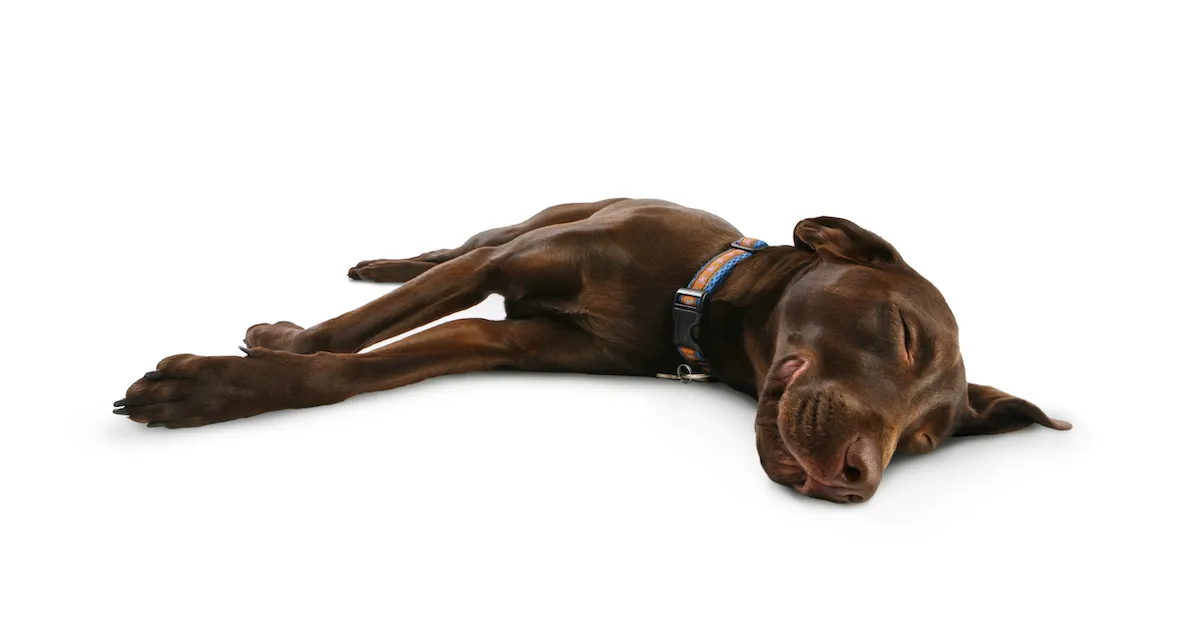Have you ever got the warm fuzzies from looking at a sleeping dog and wondering what they’re dreaming about? Most dog owners will have noticed their pooch twitching or paddling their feet in the air as they doze, and at some point, attributing it to chasing a troublesome squirrel.
What do dogs dream about?
It might seem obvious to pet parents across the world that a dog making scampering motions in his sleep is probably chasing something. And, as it turns out, they may be right. So, what do dogs dream about? Well, despite the size difference, there is a striking similarity between the structure of human brains and that of our furry companions. Both show similar cycles of electrical activity (sleep cycles), and this similarity has led researchers to speculate that dogs dreams are much like ours, in that they are processing events from the day’s activities.
Dreamland for dogs is likely made up of elements (or fragments) of real life, woven together in mixed up scenarios, and since you are a big part of their lives – that includes you. Yes, all those walkies, belly rubs, ear scritches and rewards for good behaviour feature in your pups night-time adventures. And, considering dogs have a more muted view of the world than we do in terms of colour, we can assume this is reflected in their visual imagery of the dream world.
Read more about dogs:
- Owning a dog can improve your heart health
- (Ca)nine famous dogs in science history that need to be remembered fur-ever
- Best dog gadgets to spoil your furry friend
Just like humans, dogs go through sleep cycles of Rapid Eye Movement (REM) sleep and non-REM sleep. But despite having daily doggy downtime of between 12 and 14 hours, our canine friends have much shorter sleep cycles than us. Whereas we might have four to six 90-minute sleep cycles, dogs can experience around 15-20 cycles per night. And it’s during REM sleep (as opposed to non-REM sleep) where, like us, they likely do most of their most vivid dreaming.
Dog researcher Dr Stanley Coren, author of the book Do Dogs Dream?, took this a step further, and found that larger dogs have longer sleep cycles, experiencing a new dream every 90-ish minutes. Smaller dogs, however, have shorter dreams but dream more frequently. Chihuahuas, for example, dream every 10 minutes.

How do we know dogs dream?
Research Assistant Professor Kenway Louie and Professor Matthew Wilson of the Massachusetts Institute of Technology (MIT) studied the neurons in the rat hippocampus (the region of the brain involved in memory and learning) to investigate the pattern of neural activity during REM sleep.
They employed a behavioural task known to produce distinct brain activity over longer periods (running around a circular track for a food reward) and compared this with subsequent REM-sleep episodes for similar patterns.
Their research indicated that the rats were recollecting specific experiences while asleep, in other words - the rats were dreaming. Specifically, the researchers were even able to tell which part of the track the rats were dreaming about. Similar results have also been seen in mice and cats, so it is reasonable to conclude that dogs (and perhaps all mammals) also have visual dreams.
What do dogs dream about when they bark?
But it’s not just paw twitching that can be an outward indicator that your pooch is dreaming. It’s very common for dogs to react subconsciously to dream images by also wagging their tail, whining, snarling, lip curling or even barking - often surprising themselves awake in the process. But this doesn’t necessarily mean your dog is having a nightmare, rather that they are barking at something they would normally bark at during the day. It is, after all, a form of communication for them.
Unlike humans, dogs are not as creative with their imagination (even while asleep), so it’s unlikely they would experience nightmares as we do. Rather, they may relive traumatic memories, such as the dreaded b-a-t-h or the terrifying arrival of the morning mail.
If you are concerned about your pup having a nightmare, waking a sleeping dog is never a good idea. Not only does it interrupt their sleep cycle and disrupt restorative REM sleep, being startled awake may result in an accidental snap. At best, it might result in a sleepy pup the next day.
So, although it’s likely they may be dreaming of you (or your scent), it’s best to let sleeping dogs lie.
Read more about pets: